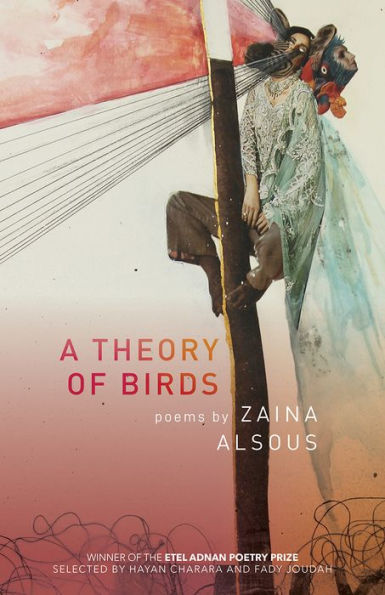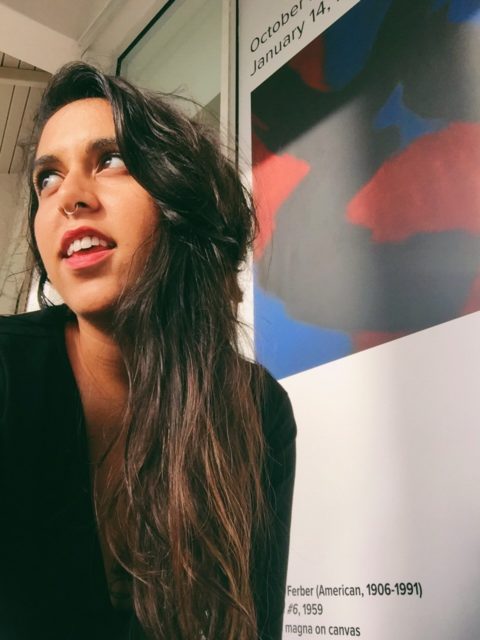The title, A Theory of Birds, aligns two allegiances of Zaina Alsous’s debut poetry collection — on the one hand, her rigorous philosophical critique of reality (in particular, its imperial and Anthropocene guises), and on the other, her longing to participate in the pure and instinctive song of birds, one of the oldest tropes of poetry. As she writes in “Being-Nothingness,” “The dervish in me can’t let go of my addiction / to theory.”
A Palestinian American poet and political organizer, Alsous’s takes the political nationalism of the Palestinian movement — glimpsed epigraph like “free the land” — and translates it as more than a call for a Palestinian state. It becomes, over the course of the book, an invitation to wider forms of belonging, beyond mere ownership — visible perhaps because of the vision that dispossession paradoxically enables.
In the title poem “A Theory of Birds,” Alsous wrestles with her relationship to “there,” a Gaza city where “canaries are raised / for sale,” a metonym for the bigger cage of Gaza, often called the biggest open-air prison on the planet. Shifting scenes, she imagines in a cardinal the spirit of her grandmother. The poem ends:
… I have
wanted love more
than history;
to be chosen
by another bird,
an arranged cluster
of sunflowers, breeding
more sun,
a sun race,
maybe then
a return,
maybe wingspan,
elsewhere.
I am not
a proud beast.
these feathers
are merely pinned
amidst shoulder,
mimicking the sound
of dusk. Soon, soon.
 The predicament of Palestinian exile, compounded by farther and farther peregrinations, elicits longing without the satisfaction of arrival. It’s why, perhaps, that the Palestinian story is compelling, even romantic, to thinkers and writers. (Ironically, it has replaced the compelling Jewish story of longing for homeland prior to the founding of Israel.) The story of exile is fundamentally an erotic story, about loss and longing — and therefore, the poetics of unattainability is seductive for outsiders but useless for the people living in it. Alsous’s approach to the problem explores her own discomfort with the idea itself. She doesn’t relish the romance. She refused to buy the myth. She feels like a fake bird, her wings unworkable, a mimic, a theory of a bird.
The predicament of Palestinian exile, compounded by farther and farther peregrinations, elicits longing without the satisfaction of arrival. It’s why, perhaps, that the Palestinian story is compelling, even romantic, to thinkers and writers. (Ironically, it has replaced the compelling Jewish story of longing for homeland prior to the founding of Israel.) The story of exile is fundamentally an erotic story, about loss and longing — and therefore, the poetics of unattainability is seductive for outsiders but useless for the people living in it. Alsous’s approach to the problem explores her own discomfort with the idea itself. She doesn’t relish the romance. She refused to buy the myth. She feels like a fake bird, her wings unworkable, a mimic, a theory of a bird.
Alsous’s poems are at their most exciting when brilliance of thought meets the sheer dizziness of style, when language deforms into a new door. I think of “Description de l’Egytpe,” which refers to Napoleon’s imperial project of gathering information about the Orient. More than a mere rehearsal of Saidian critique, the poem falls down the well dug by the epistemic violence of naming:
One morning my birth is an ink line
in the language of plantations
I grow to watch the memory assemble me:
a fiction of poppies and idolatry,
gradient in supernumerary fervor,
bloody at the footnote. There is a door that betweens
me and then, the authors say the door is always open,
the ghosts say the door is not for us.
Just listen to the music: the assonance of “language of plantations,” “the “w” sounds in “grow” and “watch,” yielding to the assonance and rhyme of “memory assemble me.” This is the birdsong drunk on the song. I love that use of “betweens” as a verb, as it is the liminal space that Alsous wants to create in her poems, where so much resides. She knows the hold of the past on us, and feels stuck between entering into it and knowing that it is itself another fiction that owns us.
The figure of the dodo recurs in her work as an image of extinction and ghostly persistence. In some sense, the dodo became one of the first touchstones of a world culture aware of its ability to erase entire species, a first sign of the Anthropocene. The dodo lives, paradoxically, as a ghost-guilt of imperial power. What a perfect bird to become the spirit animal for a poet concerned with the nexus of imperial naming and disappearance. In “Notes from the Gallery of Evolution,” describing her seeing the skeleton of the dodo, she writes:
To look remains
first person. Unclassified, to be determined. I have come
as vocabulary. I will report back what I was told.
The beast picked apart was an intention towards peace. I did
not press my nose to the glass.
As Orientalism makes clear, the production of knowledge itself can be a violence, insofar as it attempts to recreate a preset version of reality, where Arab women are slaves who need to be saved (and thus, will likely be destroyed). As Alsous writes in “‘Arab Making’,” which seems like a version of Baraka’s controversial “Somebody Blew Up America,”
Who is my name
Who painted Gerome’s fingers
as poppies crowding my throat
Who marketed Mia Khalifah’s penetration
Who made me watch
Who filled my cervix with sand
Who noctured us desert and film
Who invented me begging
softly to be destroyed

Alluding to a Lebanese porn actress who got famous for wearing a hijab in a sex film, Alsous captures the predicament of the Arab woman, caught amid so many images and projections, and her own complicity in watching this unfold.
Alsous brings to light that which is unnamed. In “Translator’s Essay,” for example, she wrestles with the “professor,” the “artist,” and the “grad student” — men who prey on woman, from Columbus to Picasso, that she will not dignify by naming. No, she wants to remember, in this poem, Bhanu Kapil, Ana Mendieta, and the monstrous Medusa. Alsous is not a poet who righteously condemns and cries out for the missing. Her stance is self-indicting, confessional, and yet that vulnerability feels like a kind of power. She stands for the missing, struggling with her own desire to be among the lost: “Every time I look for women, I become more bird.”
In an extant poem not in this collection, Alsous writes, “I never find a picture frame for my arm hairs.” It’s a great synecdoche for the general argument that representations don’t capture our creaturely wild selves, who we are beyond the versions of us promulgated by an Orientalist vision. Which is to say: I don’t see myself in any of these depictions of me and where I’m from, how it feels to be me.
There is a strong longing in the book, expressed earlier by the image of pinned wings, for finding revolutionary power in herself. As she writes in “Violence”:
In a high-school history class, white children raised
their eyebrows when I raised my voice.
I don’t know what they thought I was capable of;
I wish I was more capable of it.
There is something wild and a longing for the wild that makes these poems so vital, so important, and bring me such hope. At its best, Alsous’s poetry does not settle for gestures of brittle rebellion. It emerges from and unfolds into a post-grief ferocity, a steady fidelity to the unnameable, what cannot be domesticated, stripped, and destroyed.
It is post-grief because she knows what she (and all of us) are capable of, have done. As she writes in “Arabidopsis,”
My first surrender was the need to be understood.
My first failure: domestication, an inheritance of kingdom.
I was too wet in the summer to yield saffron. I was too angry
to mom. Too demographic for rurality. Too middle class
for truth.
That grief is a step to something else. As she writes, in “birds survive the death of Nature”: “Everything they teach about enlightenment leaves /prisoners or my mother out. To answer your question: / I refuse.” What precisely will be the next steps is not quite clear. To a descendant of refugees, what can return look like, to a land where one has never lived? What if return could mean something else entirely?

Which leads us back to the epigraph of A Theory of Birds: “free the land.” What first looks like a political gesture of national liberation for Palestine, by the end of the book, appears to be something far more complicated and radical — a call to liberate the land, to free earth, from all of our projections and dominations, not just Zionism’s. It’s intriguing to me that her work, like George Oppen’s (another political organizer), doesn’t strain to be “political.” For Alsous, poetry is a dreamspace to wrestle the present and imagine past the past.
Her work heralds a new vision, alongside other young Palestinian American poets like George Abraham, Hala Alyan, and Noor Hindi (not to mention my generation’s poets Fady Joudah, Deema Shehabi, and Lena Tuffaha), of a new way of thinking and writing diaspora, (Palestinian) exile, and our planetary future.
The poem “birds survive the end of Nature” provides a clue to Alsous’ thinking. It ends: “Listen, next time, the flowers are naming themselves.”
[Published by the University of Arkansas Press on October 14, 2019. 88 pages, $16.95 paperback]